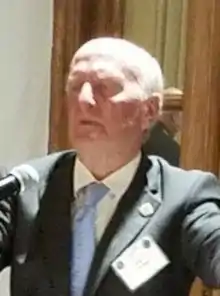Samuel Frederick Biery Jr.
Samuel Frederick Biery Jr. (born November 11, 1947) is a United States district judge of the United States District Court for the Western District of Texas.[1][2][3]
Samuel Frederick Biery Jr. | |
|---|---|
 | |
| Chief Judge of the United States District Court for the Western District of Texas | |
| In office June 1, 2010 – December 31, 2015 | |
| Preceded by | Walter Scott Smith Jr. |
| Succeeded by | Orlando Luis Garcia |
| Judge of the United States District Court for the Western District of Texas | |
| Assumed office March 11, 1994 | |
| Appointed by | Bill Clinton |
| Preceded by | Seat established by 104 Stat. 5089 |
| Personal details | |
| Born | Samuel Frederick Biery Jr. November 11, 1947 McAllen, Texas, U.S. |
| Education | Texas Lutheran College (BA) Southern Methodist University (JD) |
Education and career
Born in McAllen, Texas, Biery received a Bachelor of Arts degree from Texas Lutheran College in 1970 and a Juris Doctor from the Dedman School of Law at Southern Methodist University in 1973.[1] He served in the United States Army Reserve from 1970 to 1976 where he became an E4.[1] He was in private practice in San Antonio, Texas from 1973 to 1978.[1] He was a judge on the County Court at law number two in Bexar County, Texas from 1979 to 1982.[1] He was a judge on the state 150th District Court from 1983 to 1988.[1] He was a Justice of the state Fourth Court of Appeals from 1989 to 1994.
Federal judicial service
On November 19, 1993, Biery was nominated by President Bill Clinton to a new seat on the United States District Court for the Western District of Texas created by 104 Stat. 5089.[2] He was confirmed by the United States Senate on March 10, 1994, and received his commission on March 11, 1994.[2] Biery was elevated to chief judge on June 1, 2010, his term as chief judge ended in late 2015.[2] On April 29, 2013, his ruling on 35 Bar and Grille LLC, et. al. v. The City of San Antonio reached press notoriety for its use of puns, sexual innuendo and double entendres.[4]
In June 2022, Biery claimed that he does not read opinions handed down from the Fifth Circuit, only to later claim his remarks were "courtroom banter".[5]
References
- "U.S. District Judge Fred Biery". United States District Court for the Western District of Texas. Retrieved 2018-08-21.
- "Biery, Samuel Frederick, Jr". Federal Judicial Center. Retrieved 2018-08-21.
- "Samuel Frederick Biery Jr". OpenJurist. Retrieved 2018-08-21.
- Easterman, Daniel (May 1, 2013). "The Itsy Bitsy Teeny Weeny Bikini opinion: Texas judge issues world's cheekiest written ruling". The Telegraph (UK). ISSN 0307-1235. Retrieved May 2, 2013.
- Cassens Weiss, Debra (June 14, 2022). "Texas federal judge proclaims that he doesn't read 5th Circuit opinions before second reversal". ABA Journal. Retrieved August 4, 2022.
External links
- Samuel Frederick Biery Jr. at the Biographical Directory of Federal Judges, a public domain publication of the Federal Judicial Center.